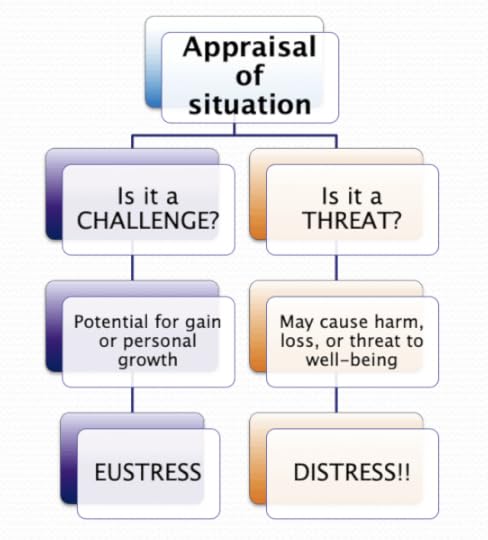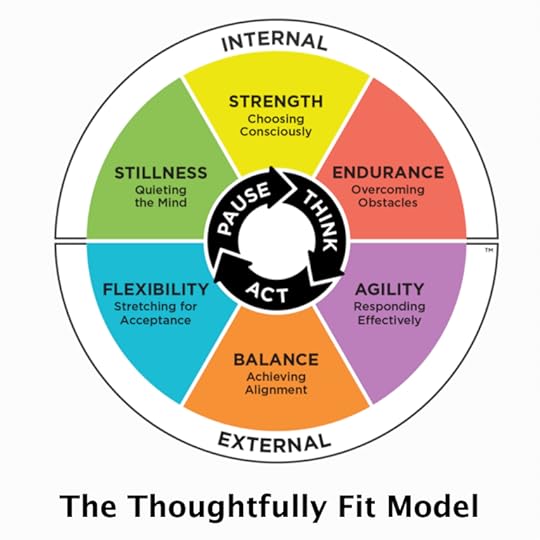Tina Hallis's Blog, page 10
September 12, 2021
I’ve Been Saving All My Problems for You. Fake Positivity is Exhausting!

If you live with kids and/or a partner, have you ever felt like they save all their problems until they get home? Then they dump them out on you? After all, you’re their safety net, confidant, and caretaker. They can be real with you.
Or maybe your the one who’s been trying to put on a pleasant face all day at work, only to let it all out once you get to the safety of your home. You feel wiped out after putting so much energy into your facade and now your willpower, internal resources, and endurance are gone.
Pretending to be upbeat is exhausting! It’s unsustainable, and people can often see through it. But to be successful in our job, we often need to be calm, collected, and resilient. Is there another option that won’t sap our energy and happiness?
That’s what I love about Positive Psychology! It’s not about pretending to be happy or forcing a smile. It’s about sharpening our positivity skills so everything gets easier. It’s about practicing strategies that actually change our brain so we’re less stressed, more motivated, and authentically nicer to be around, at work and at home.
So when you’re practicing gratitude, looking for the good in your day, or savoring a favorite memory, you’re not doing it just for yourself, you are also elevating the quality of life of everyone around you. You are being a positivity catalyst that impacts your family, your workplace, and your community.
It’s not about acting more positive; it’s about being more positive and letting it show.
What are your favorite practices that build your positivity? Keep up the good work!
September 4, 2021
Is Shifting Our Perspective for Less Stress Just Propaganda?

Since my diabetes diagnosis a few years ago, I’ve been on a mission to learn the latest science on personalized healing, nutrition, and disease. So I was interested to recently discover the Walsh Research Insitute that uses natural interventions to correct the biochemistry of people with mental disorders, ranging from autism to depression to bipolar disorders. As I enthusiastically proclaimed their approach to my husband, he shot me down by asking what proof they had to support it.
He had a valid concern, and I had just started looking into the institute’s references and studies, so I didn’t have a solid answer. But what I did know was how his questioning triggered my status threat response. Was he doubting my ability to discern good science from opinions and propaganda? After all, I had spent my career as a scientist in biotech!! Luckily I was able to pause, notice my reaction, and choose a Sage response. “Good question. What I’ve seen so far looks to be based in studies and research.”
Shirzad Chamine’s Positive Intelligence approach says that all stress is generated by our Saboteurs (survival instinct). And if we can shift to Sage mode, we can reduce our stress by looking for the gift or opportunity in the situation. This may sound simplistic or esoteric. That’s why I strongly appreciate Shirzad’s references back to the science. And, I appreciate finding even more evidence that convinces me that this concept is valid.
For example, I recently learned about Lazarus and Folkman’s famous Psychological Stress and Coping Model first published in their 1984 book, Stress, Appraisal, and Coping. Despite being described over 35 years ago, it remains the cornerstone of psychological stress and coping research across multiple fields.
The model says that stress is a process that starts with an appraisal of the situation. If we perceive it as a threat (our Saboteur in action), we will feel bad stress or distress. If we’re looking at it from our Sage, it will be easier to see it as a challenge with possible opportunities, resulting in good stress or eustress.
My husband’s questions about the validity of the Walsh approach triggered my saboteur and I saw it as a threat. It took a few seconds, but I was able to shift and appreciate his challenge using my sage.
Think about a current stress. Is there a way to shift and see it as a challenge instead of a threat?
August 28, 2021
Fear Setting vs. Goal Setting – What’s Holding You Back?

I stumbled upon this TED talk by Tim Ferriss, author of The 4-Hour Work Week. Instead of just defining our goals, he suggests we should define our fears. What’s getting in the way of achieving your goals, your dreams, your happiness, and your ultimate success?
It could be asking for a promotion, starting a company, or asking someone on a date. It could be deciding to go back to school, to end a relationship, or to change course in your career. It could be setting boundaries and saying no. It could be taking time for yourself.
“There’s no difference between a pessimist who says, ‘Oh, it’s hopeless, so don’t bother doing anything,’ and an optimist who says, ‘Don’t bother doing anything, it’s going to turn out fine any way.’ Either way, nothing happens.”
— Yvon Chouinard, founder of Patagonia
Whether you’re a pessimist who assumes things will go wrong or an optimist who thinks that things will eventually get better, inaction does not move you towards a better life.
Tim has a process he uses to help him with his fear-setting process.
The idea is to fully acknowledge the worst possible outcome of your potential action. To dig into the details on paper so you know them inside and out. What would that look like? How bad would it be? Would you survive? Could you recover?
Then the focus shifts to the potential upside of taking action, even if you don’t fully achieve your desired outcome.
Here are the questions in Tim’s fear-setting practice:
What are the worst possible things that could happen if I take this action? Let all ideas flow, no matter how unlikely or silly.What could I do to prevent or decrease the chances of these things happening?If the worst-case scenarios happen, what could I do to repair the damage, even a little bit? Who could I ask for help?What might be the benefits of an attempt or even a partial success? Consider things learned, skills improved, confidence gained, etc.If I avoid this action, what would my life look like in 6 months, 1 year, 3 years? Include emotional, financial, & physical details.I would love to hear how this works for you!
August 21, 2021
Are You Careful What You Care About?

I told my husband that my appointment was on Wednesday. Later, I realized he thought it was on Thursday. He said, “You told me it was Thursday.” I thought he heard me wrong. He thought I said it wrong. I wanted to argue, but did it matter?
The committee wanted to add more activities to raise money so we could have more events. I wanted to keep things simple and easy; after all, we were volunteers and didn’t have the extra time. But the leader was determined and pushed their recommendation through. I could resist and feel frustrated, or I could accept it. How much did it matter?
The email asked me if I was available on October 14th. They were a large organization and interested in hiring me to train their people on improving their positivity skills. It was a fantastic opportunity! I was excited until I saw my calendar. I had already committed to speak at an association conference that day. Was I going to feel bitter or regretful?
Whether it’s things at work or things at home, are you careful what you care about? Are you careful what you spend your time, energy, passion, and emotions on? Or, like so many of us, do you get tangled up in the weeds of life instead of focusing on what really matters?
For example, do you care too much about –
The little things?Who’s right?Things you have no control over?Other people’s business?What other people have/do?A helpful way to measure how important something is, is to ask yourself if it will matter in a year. If the answer is no, take a breath (or several), and decide that everything is OK. You might want to have a conversation with yourself about what really matters and what doesn’t.
August 15, 2021
What Happens When You Change the Way You Look at Things?

My daughter and I traveled to the east coast this past week. She’s interested in going to college somewhere far from home – maybe a big city, so it seemed important that she see more of the United States. We’ve visited New York City and Boston and even Ithaca in upstate New York to give her a taste.
Before we started, I told her my goal was to laugh when things got stressful, like getting on the wrong subway or dragging our luggage through the busy streets of New York. She agreed. We were going to do our best to see these kinds of things as adventures and entertainment, not just frustrations.
We’ve had many opportunities to practice this shift in perspective. We’d never used public transportation before, but we’ve managed to take several subways (not always the right one…), buses, trains, and even a ferry. We didn’t always have the right ticket but people have helped us and my daughter’s become a pro at figuring out how to buy them on her phone (even under intense time pressure as the bus waited).
We’ve often been confused as to where to go, whether it’s taking the wrong exit in our rental car, walking the busy streets, or finding the right bus/train/subway terminal. Backtracking is just part of the process.
We’ve done a lot of walking while the temperatures have been in the 90’s. Hot, sweaty, thirsty, we’ve still focused on the adventure of it all (most of the time.)
During one of our many interesting and bonding conversations, my daughter commented on a quote I often use at the end of my talks. She said she’s come to realize how profound Wayne Dyer’s saying is;
“When you change the way you look at things, the things you look at change.”
She noted it has nothing to do with the physical view, but it’s all about how you think about situations. Yes!!
What situation, current or future, could be so much easier and less stressful if you shifted the way you think about it?
August 6, 2021
Do You Know When NOT to Encourage Others? The Difference Empathy Makes

Imagine your coworker comes back from a meeting and starts venting about how humiliated they were by another person’s response to their project update. Their frustration is boiling over as they tell you how this other person berated them for not doing the project a certain way, and they did it in front of everyone. What do you say?
“It’s not a big deal. I’m sure they were just trying to be helpful.”“Don’t worry. Everyone knows that they tend to pick things apart.”“Your fine. That person is just a jerk.”Today we stopped by school so my daughter could get her parking permit for the school year. She came back to the car very upset. All of the permits were already taken. My first thought was to tell her that it’s not a big deal. She’ll just have to park further away and walk. And that walking to class is what she’ll have to do in college anyway so this is good practice.
After a few moments, I realized these comments would NOT make her feel better. Instead, this situation called for empathy, NOT encouragement.
Empathy is feeling with people. It’s connecting with something in ourselves that knows that feeling. In this cute and touching video, Brené Brown points out that empathy is,
Recognizing the person’s perspective as their truthStaying out of judgmentRecognizing their emotionLetting them know you understand their emotionEmpathy doesn’t start with “At least…” And it doesn’t try to make it better. Empathy is feeling their sadness, anger, frustration, with them.
For my daughter, I focused on how much the permit meant to her and said, “That sucks! I’m sorry.”
For the coworker situation above, it could sound like, “Wow! That sounds terrible!”
I tend to want to “fix” the situation or at least make the person feel better. But as Brené says, sometimes we need to go down in the hole with the person instead of trying to pull them out.
The next time someone gets upset, ask yourself if empathy would be better than encouragement.
July 31, 2021
I Had a Rough Day! Let Me Tell You All About It

When you’ve had a rough day, do you ever vent or complain to your family or friends? Maybe you had to deal with a difficult customer, or there was a frustrating meeting, or you just had too much to do. It’s normal for us to remember and share all the bad things that happened to us. It’s part of our survival instinct to replay and dwell on problems and stresses in our lives.
But what if you also shared some of the good from your day? This can take some effort and intention because we have to override our survival instinct that tells us to ignore all of the positive stuff. This primitive part of our brain tells us we don’t need to notice the good because it’s not a threat and doesn’t require us to take action to protect our survival. In fact, it would tell us that anything positive is boring!
For example, how often do you appreciate the green lights when you’re in a hurry? How often do you notice the easy customers compared to the difficult ones? How often do you thank your helpful co-worker compared to complaining about the one who never seems to get their part of the project done?
Remember, this is normal! But we can train our brains to get better at also noticing the good by intentionally talking about it.
Try this exercise. Every evening at dinner or bedtime, think back on your day and recall three good things. These can be simple, easy things like having that green light when you were late or the fact that your favorite socks were clean. Then either write them down or share them with a friend or family member to change your brain even faster. I used to love doing this with my daughter at bedtime when she was little. Now that she’s a teenager, I go to bed before she does!
Give it a try for a couple of weeks and see if it doesn’t get easier.
July 25, 2021
Do You Ever Suffer a Loss of Brainpower? Here’s what not to do

I recently found out that my Facebook account had been hacked, and someone had started a campaign that was charging my PayPal and credit card $250 a day. And I was locked out of my Facebook account so I couldn’t notify them of the problem. Verifying my account turned into a headache because I don’t get a cell signal at home so they couldn’t text me a verification code. And figuring out how to contact Facebook about the hack was a challenge in itself.
The point of my story is that I was totally frustrated and upset!! What I’ve learned from Positive Psychology is that when we’re in the midst of frustration (when we’re the schmuck stuck in the muck) we suffer a loss of brainpower. We can become overwhelmed by our survival instinct and have a hard time thinking clearly.
I knew that during this time, it was better if I did NOT –
make any decisionstry to solve problemsattempt any activity that required focushave an important conversationI knew I needed to give myself permission to feel my emotions, and that my resilience would help me to eventually recover my brainpower.
After a few hours and a few conversations with myself, it was easier to calm down and believe that it would all get worked out.
When life happens, and your survival instinct gets you upset, it’s so helpful to remember what NOT to do. Besides the list above, what are other activities you know you should avoid when you’re upset?
July 18, 2021
Misunderstandings and Hurt Feelings – The role of our survival instinct

We just bought a popup camper! Yay! Since we’ve always used a tent, I’m looking forward to a more luxurious and comfortable experience. But we have a lot to learn.
For example, my husband was trying to explain to me that the overhead lights in the ceiling have a jack to plug in a reading light. I was totally confused. Why would I want a reading light right next to the dome light? So I kept asking questions.
I could tell my husband was getting impatient by the tone of his voice. Did he think I was stupid? My survival instinct didn’t like his judgment (real or imagined). I could feel myself getting irritated. So I took a breath.
Finally, I understood that the reading light had a long stretchy cord so you could plug it in and then move it into the bed area. Cool!
It reminded me how a misunderstanding or confusion can lead to an argument or hurt feelings. Maybe we hear someone wrong, or they don’t understand us. The next thing we know, we’re feeling upset. Has this ever happened to you?
Just last night I made a new kind of pizza. My husband asked, “Why do you call it buffalo chicken pizza? There’s no buffalo meat on it.” I impatiently replied that I’m not the one who named it buffalo chicken. He looked at me funny and then said, “I asked why they call it buffalo chicken, not you.” Ah, yes; another misunderstanding that triggered my survival instinct.
Our survival instinct is a reflex. It’s super fast and always on guard. So it takes some practice to override it. Here are some of my favorite approaches to make it easier;
Take a breathRemind yourself that your irritation is due to this strong instinctStay curious about your own reaction and the other person’s reaction (What did they really mean? What did they misunderstand?)Find empathy. Both you and the other person are wired to have a strong Judge and to jump to the worst conclusionLife constantly gives us opportunities to practice this approach. Sometimes we might fail, but if we keep trying, it does get easier. Look for opportunities this week ??
July 11, 2021
What Does It Mean to Be Thoughtfully Fit? Starting with Flexibility

Today I’m super excited to bring you a peek into an amazing new book written by one of the wisest, most insightful, kind, and inspiring people I know, Darcy Luoma. Her book, Thoughtfully Fit: Your Training Plan for Life & Business Success, not only teaches her Thoughtfully Fit model, in it, she shares her heart-breaking and gut-wrenching story of her husband’s arrest. Darcy talks about how her family and her life depended on her ability to hold it all together, despite her world falling apart. Luckily, she had her Thoughtfully Fit framework to guide her through the worst crisis of her life.
In this tip, I’ll focus on Chapter 11 and the practice of Flexibility: Stretching for Acceptance.
“I chose to accept people wherever they were in their thinking about John–though it wasn’t always easy or my first instinct–and I chose to accept their reactions to his arrest. That’s Flexibility. I didn’t want to waste energy trying to change anyone’s mind or being angry at them. By accepting them just as they were, even if I didn’t understand or agree, I saved myself unnecessary frustration.”
Darcy points out that it’s easy to accept others when we agree with them. But when we practice acceptance even when we disagree, we have more energy to invest in things that matter most to us; we waste less energy in negative emotions that serve no purpose.
If acceptance feels too hard, Darcy suggests at least accepting that we can’t change them. It might mean we need to set new boundaries and adjust how we interact with them. The key is to focus on those things we can control like our reaction to their behavior instead of how we think they should behave.
The chapter includes a summary that Flexibility is:
Letting go of judgmentAccepting others as they areFocusing on what’s in your controlDarcy includes a series of questions for reflection, including:
How is my judgment of this other person affecting me?What’s the cost of accepting or not accepting this person?If it’s too hard, can I at least accept that I can’t change them?Consider how these questions can help you stay flexible with other people this week.
Darcy Luoma is a Master Certified Coach, dynamic facilitator, and inspiring motivational speaker. You can find Thoughtfully Fit at most bookstores, including Amazon.



